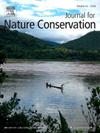Conservation of the genetic diversity of Turanga poplars for restoration of population sustainability in desert and semi-desert regions of Kazakhstan
IF 2.5
3区 环境科学与生态学
Q2 BIODIVERSITY CONSERVATION
引用次数: 0
Abstract
For the first time in Kazakhstan, a comprehensive study was conducted on the conservation, seed propagation and determination of the sex of seedlings in the juvenile stage of development to restore population stability of Populus pruinosa Schrenk and Populus euphratica Oliv. The seeds of Turanga poplars are classified as intermediate, meaning they lose viability relatively quickly. The optimal methods for long-term preservation have been identified. Seeds lose their germination capacity within 3–6 months under traditional storage conditions of +20 °C and –20 °C. By contrast, cryopreservation in liquid nitrogen at –196 °C was effective: seed germination and germination energy remained stable and comparable to the control after 12 months, and even after 5 years, across all species studied.
It is crucial to determine the sex of plants at early developmental stages to restore declining populations and urban landscape areas. The polymerase chain reaction (PCR) method, using ISSR primers IS A02 and IS A71, was employed to identify male and female individuals during the juvenile seedling stage. In Populus pruinosa Schrenk, 14 male and 10 female genotypes were identified, while in Populus euphratica Oliv., 6 male and 6 female genotypes were detected.
To support the restoration of Populus euphratica Oliv. and Populus pruinosa Schrenk populations, 400 male and female seedlings were cultivated in pots. Additionally, to preserve genetic diversity, 100,000 seeds of both Turanga poplar species were stored under cryopreservation conditions.
保护图兰加杨树遗传多样性以恢复哈萨克斯坦沙漠和半沙漠地区种群的可持续性
为恢复胡杨(Populus pruinosa Schrenk)和胡杨(Populus euphratica Oliv)种群的稳定性,在哈萨克斯坦首次对胡杨(Populus pruinosa Schrenk)和胡杨(Populus euphratica Oliv)幼龄发育阶段的养护、种子繁殖和幼苗性别测定进行了综合研究。图兰加杨树的种子被归类为中间品种,这意味着它们很快就会失去生存能力。长期保存的最佳方法已经确定。在+20°C和-20°C的传统储藏条件下,种子在3-6个月内失去萌发能力。相比之下,在-196°C液氮中低温保存是有效的:在12个月甚至5年后,所有研究物种的种子萌发和萌发能量保持稳定,与对照相当。在植物发育早期确定植物性别对于恢复种群数量下降和城市景观区至关重要。利用ISSR引物IS A02和IS A71,采用聚合酶链反应(PCR)方法对青苗期雌雄个体进行鉴定。在白杨中鉴定出14个雄性基因型和10个雌性基因型,而在胡杨中鉴定出10个雌性基因型。共检测到6个雄性基因型和6个雌性基因型。支持胡杨的恢复。在白杨种群中,盆栽栽培雌雄幼苗各400株。此外,为了保护遗传多样性,将两种图兰加杨的种子在低温条件下保存了10万份。
本文章由计算机程序翻译,如有差异,请以英文原文为准。
求助全文
约1分钟内获得全文
求助全文
来源期刊

Journal for Nature Conservation
环境科学-生态学
CiteScore
3.70
自引率
5.00%
发文量
151
审稿时长
7.9 weeks
期刊介绍:
The Journal for Nature Conservation addresses concepts, methods and techniques for nature conservation. This international and interdisciplinary journal encourages collaboration between scientists and practitioners, including the integration of biodiversity issues with social and economic concepts. Therefore, conceptual, technical and methodological papers, as well as reviews, research papers, and short communications are welcomed from a wide range of disciplines, including theoretical ecology, landscape ecology, restoration ecology, ecological modelling, and others, provided that there is a clear connection and immediate relevance to nature conservation.
Manuscripts without any immediate conservation context, such as inventories, distribution modelling, genetic studies, animal behaviour, plant physiology, will not be considered for this journal; though such data may be useful for conservationists and managers in the future, this is outside of the current scope of the journal.
 求助内容:
求助内容: 应助结果提醒方式:
应助结果提醒方式:


